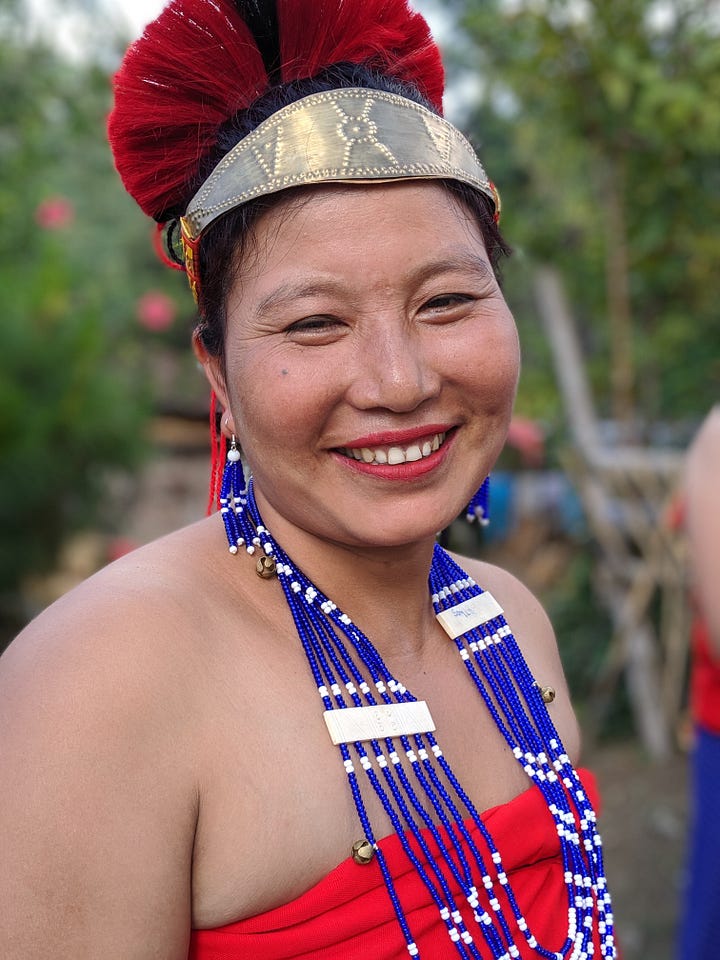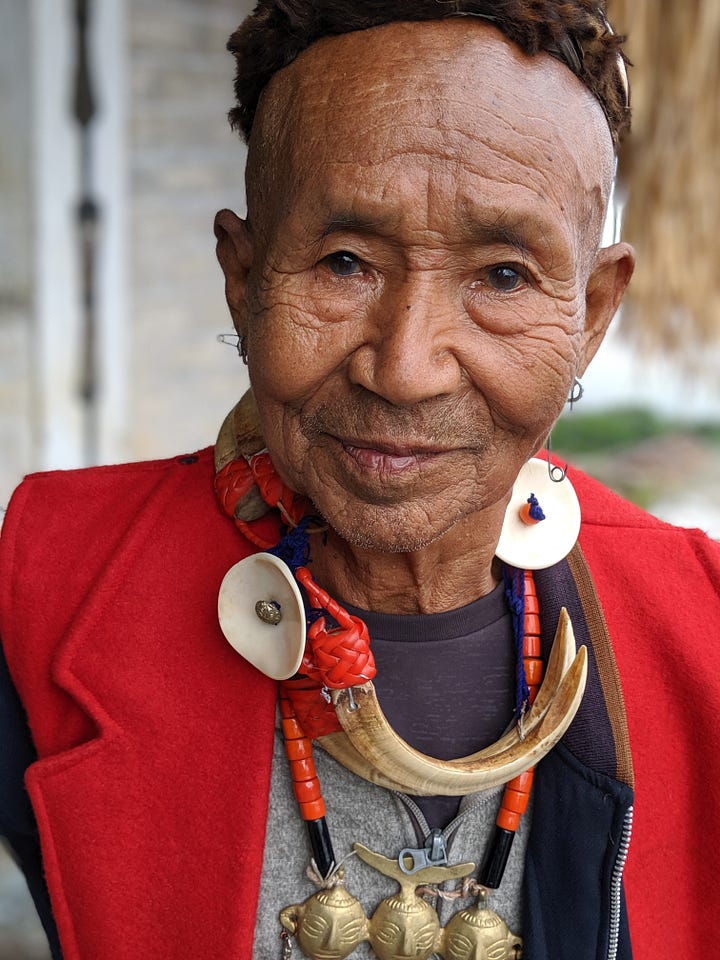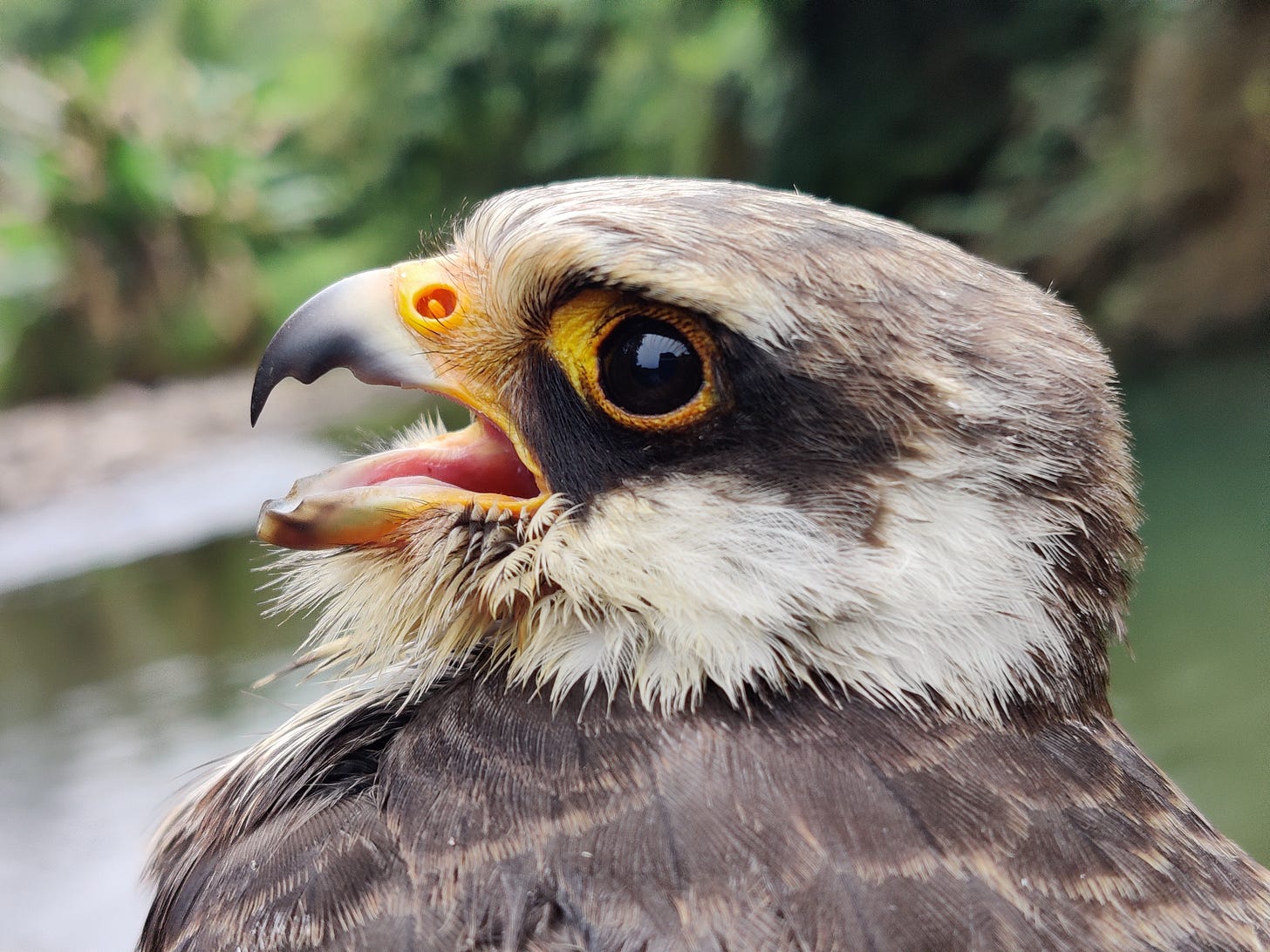The Noblest Way to Spend a Human Life
To Northeast India, for a story of hope, courage and community
I’m writing this from Javea in south-eastern Spain, where the default setting is sunshine and polished blue skies. My husband and I have decamped here for a month - to work, see friends and explore the area on our bicycles. As much as I love Wales, it’s a refreshing change from damp cold and battleship-grey.
Spain and sunshine aside, I’m finding it hard not to feel destabilized by the news at the moment. So today I’m bringing you a story about an ordinary man doing extraordinary things - a reminder that, in spite of everything, there is still so much goodness in the world.
I first met Nuklu Phom in 2019, whilst recording a radio documentary about community-conservation efforts in the Northeast Indian state of Nagaland. Yaongyimchen, his ancestral village, perches atop a mountain, its brightly-painted wooden houses unzipping the spine of a ridge. Red splashes of bougainvillea trail over bamboo fences. Women walk up dusty tracks, baskets of firewood strapped to their heads. And in all directions spread the Naga hills, the vivid emerald of the nearest bluffs smudging to a blue, supernal mist. From here, on a clear day, you can see the peaks of the Himalayas on the northern horizon, and the Brahmaputra glittering on the plains below.
In 2007, after more than a decade away studying in Allahabad (now Prayagraj), Nuklu returned home to find the forests empty of wildlife. While the Naga have always had famously omnivorous tastes, (“We Naga eat anything that moves, apart from humans!” one local man joked) cultural shifts, unemployment and the proliferation of automatic weapons had tipped the natural balance. Central to this was the Naga’s decades-long struggle for independence from India, a conflict that cost an estimated 200,000 Naga lives. Rather than using spears and traps, men now hunted with automatic weapons. Tigers were no longer heard roaring in the forests. Dynamite fishing had devastated the rivers.
A charismatic, religious man, Nuklu took a job as head of the local Baptist Association and began to use the church as a platform for preaching conservation. He bought camera traps, paying people for every animal they ‘caught’ on camera, and used the church’s influence and his status – he’s from a long line of village chiefs – to convince people to stop hunting and logging. “You can’t lecture people,” he told me, “but climate change is drying up our wells and causing our crops to fail, so people listened to my message.”
In 2010 Nuklu persuaded Yaongyimchen and their two neighbouring villages to ban hunting and set aside 10 square km of their community forest as a refuge for wildlife. It wasn’t easy, and at first he faced heavy opposition. With few employment opportunities here, hunting was a valuable source of income. One man told me he used to sell pangolin scales, popular in Chinese medicine, for 8,000 rupees (about £80) a kilo, more than most villagers earned in several months.
But slowly Nuklu’s messaging took hold, and he’s now working with twenty villages, all with conservation initiatives in various stages of development. Leopard cats, black bear and clouded leopard have been recorded here. “We think there might be a lone tiger here too,” said Nuklu, as we chatted beside the fire one evening.


But the community’s biggest success has been the Amur falcon, a bird the Phom Naga call tu-ma-loi, meaning falcon that comes from a far land crossing waters. A hardy little raptor that flies a 14,000-mile round trip each year between its Mongolian breeding grounds and Southern Africa, they pause at roost sites across Nagaland each autumn to fatten up on flying termites before crossing the Arabian Sea. Previously hunted in their tens of thousands, under Nuklu’s aegis the numbers recorded in Yaongyimchen have increased from around 50,000 to at least half a million. I witnessed this incredible spectacle myself; a sky stippled black with so many falcons they looked like clouds of gnats. It’s for his work conserving these falcons that Nuklu received the prestigious 2021 Whitley Award, the first person from Northeast India ever to do so. Given that around a million plant and animal species are currently threatened with extinction, can there be anything more noble a human can do with their life than help rescue an entire species?
I loved my time in Yaongyimchen. Days spent walking through cool submontane forest, listening to the churr of insects, the crowing of Jungle fowl and the constant, quavering call of Blue throated barbets. Evenings sitting around open fires in swept-earth kitchens, talking to local hunters and elders. One night a wizened old man with a whispering voice came to talk to me, perching on a low stool beside the hearth. When I asked him what he enjoyed about living in Yaongyimchen he thought hard for a few minutes, then said: “We grow our own food. We help each other. People don’t covet wealth, we’re happy with what we have.” I wrote his reply in my notebook, and underlined it several times.
Last year was the Earth’s hottest year on record. Global carbon emissions are currently rising at a record rate. This month the Arctic has been TWENTY degrees above its seasonal average. We are seeing the alignment of the Far-right with anti-Net Zero agendas, and alarming parallels between Hitler’s 1930s call to the industrialists and the likes of Musk and Zuckerberg throwing their hats in the ring with Trump. To say these are worrying times is an understatement. But we mustn’t give up. Defeatism and apathy are as dangerous as denial.
People like my friend Nuklu are a beacon of hope, proof that passionate individuals can bring about extraordinary change, a reminder that no one is too small to make a difference. By convincing his community to stop hunting Amur falcons, he prevented the collapse of an entire migratory species; a bird that arrives in Nagaland just as the flying termites emerge, and reaches Southern Africa in time to feed on ant and locust swarms. A free, trans-boundary pest control service whose extinction would unleash a cascade of crop failure and ecosystem collapse. Nuklu could have returned to his village in 2007, seen the state of his ancestral forests and done nothing. He could have accepted the scholarship to Princeton he’d been offered, to do his pHD. But he didn’t. And the results have been astonishing.

At an Earth Percent event in London last month, on the day of Trump’s inauguration, the organisation’s co-founder Cathy Runciman talked about the need to harness the five c’s: courage, community, care, collaboration and creativity.
At the same event Dr Tzeporah Berman, chair of the Fossil Fuel Non-Proliferation Treaty said: “Hope is something we create together, through our actions.”
So, dear friends, I am writing this to remind you (and me) that there is always hope, and that each one of us is capable of doing extraordinary things, if only we put our minds to it.
BEFORE YOU GO…
I’ve just read, and very much enjoyed, On Time and Water: A History of our Future by the Icelandic author Andri Snaer Magnason. An original, meticulously-crafted story, I can’t think of another book that’s so effectively hammered home the urgent need for climate action. As Sir David Attenborough said at a UN climate conference a few years ago: “If we don’t take action, the collapse of our civilizations and the extinction of much of the natural world is on the horizon.”
If you want to do something positive today without leaving the comfort of your armchair, please consider getting involved with the Stop Rosebank campaign. If Norwegian oil giant Equinor (whose current profits stand at £45,000 a second) get the go-ahead for Rosebank - the UK’s biggest undeveloped oil field - it will have the same annual emissions as the world’s 28 poorest countries, put an oil pipeline through a Marine Protected Area and steer the UK even further away from our climate targets. You can sign a petition, write to your MP or even request a meeting with your MP. I’ve done all three.
I haven't recorded an audio version of this month's post. Apologies. Normal service will resume next month.
That’s all for now. Thanks for being here. Please do leave a comment and share or like this post.
Love and hope,
Ants xx







